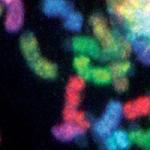
Research Topics
Dr. Stracker’s research focuses on understanding how cancer cells respond to radiotherapy, and other DNA damaging chemotherapies, and how these responses can be modulated for therapeutic gain.
A major line of research in the lab focuses on understanding the molecular functions of the Tousled-like kinases (TLKs), TLK1 and TLK2. The TLKs play a key role in chromatin assembly through the regulation of the ASF1 histone chaperones and mutations in TLK2 have been implicated in a distinct neurodevelopmental disorder characterized by microcephaly and intellectual disability. TLK activity is regulated by the DNA damage response and their depletion provokes innate immune signaling and enhances cellular sensitivity to DNA damaging agents. The Stracker lab is investigating the role of the TLKs in neurodevelopmental disorders and exploring their potential as a target for cancer therapy.
A second line of research is aimed at identifying synthetic lethal genetic interactions that can exploited for cancer therapy. The laboratory uses CRISPR/Cas9-based screening approaches to identify genes that modulate cellular sensitivity to radiotherapy and chemotherapy. The molecular mechanisms of these genetic interactions will be defined and promising leads will be explored in pre-clinical models of cancer.
Biography
Dr. Stracker received his undergraduate degree in Genetics from the University of Georgia in 1996. He performed his graduate training in the University of California, San Diego Biology program, where he worked in the laboratory of Dr. Matthew Weitzman at the Salk Insitute for Biological Studies. His thesis work uncovered mechanisms used by DNA viruses to disable key components of the DNA damage response. In 2003, he joined the laboratory of Dr. John Petrini in the Molecular Biology Program of Sloan-Kettering Institute. There his research focused on the generation and characterization of mouse models of cancer susceptibility and rare diseases associated with genomic instability. Dr. Stracker started his own laboratory in the IRB Barcelona Cancer Science Program in 2009, where he continued to study the DNA damage response and its implications in rare diseases, cancer and cancer therapy. Finally, in July of 2020, he joined the NCI as an Investigator in the Radiation Oncology Branch.
Related Scientific Focus Areas





Molecular Biology and Biochemistry
View additional Principal Investigators in Molecular Biology and Biochemistry
This page was last updated on Tuesday, November 18, 2025